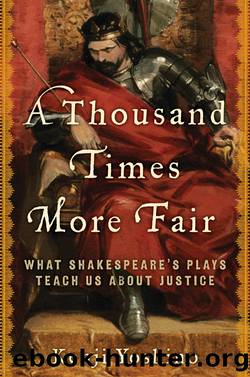A Thousand Times More Fair by Kenji Yoshino

Author:Kenji Yoshino
Language: eng
Format: epub
Publisher: HarperCollins
Published: 2011-04-01T00:00:00+00:00
Chapter Six
The Natural World
Macbeth
Macbeth has a distinctive reputation not just among Shakespeareâs plays, but among all plays. As stage historian Richard Huggett notes: âThere is one superstition so old, so all-consuming, so intimidating, that just about everyone in theater believes it, no matter how cynical, how materialistic, or hard boiled he is.â This is the superstition that Macbeth is cursed. A long stage history of deaths, injuries, technical malfunctions, and acting fiascoes has been adduced to support the curseâs existence. Actors avoid saying âMacbethâ or quoting lines from the play outside rehearsal or performance, referring to it as the âScottish playâ and its protagonists as âMr. and Mrs. M.â They often refuse to wear a cloak or helmet if they learn it was used in a production of that play. In the days of traveling repertory companies, when props and scenery for productions were intermingled, the furniture, costumes, and settings for Macbeth were scrupulously quarantined.
Special purification rituals exist for those who slip. If an actor speaks the word âMacbeth,â or a line from the play, he or she must âgo out of the dressing room, turn around three times, spit, knock on the door three times, and beg humbly for readmission.â Alternatively, the actor can quote one of two Shakespearean lines. The first is âAngels and ministers of grace defend us!â (Hamlet, 1.4.39), which Hamlet utters to protect himself from his fatherâs ghost. The other is Lorenzoâs line from Merchant: âFair thoughts and happy hours attend on you!â (Merchant, 3.4.41). While less on point, it draws on Merchantâs general reputation as a lucky play.
Given this history, I was struck on rereading Macbeth by how oddly comforting the play is about the justice of the universe. The Macbethsâ undeniable evil, which trails like squid ink behind them, dissipates by the playâs end. The Macbeths die miserably, Duncanâs virginally pure son Malcolm takes the throne, and the bright side of the witchesâ prophecyâthat the virtuous Banquoâs issue will claim the crownâis imaginatively fulfilled in the watching King James I, for whom the play was written.
Most important, the evil in the play often seems to call ânaturallyâ for its own correction. In act 1, Macbeth almost decides to spare Duncan because he fears â[b]loody instructions, which, being taught, return / To plague thâinventorâ (1.7.9â10). He continues: âthis even-handed Justice / Commends thâingredience of our poisonâd chalice / To our own lipsâ (1.7.10â12). Lady Macbeth talks him out of this belief, but stages its truth at the other end of the play. When the doctor watches the tormented, sleepwalking Lady Macbeth, he diagnoses: âUnnatural deeds / Do breed unnatural troublesâ (5.1.68â69). If the play has a moral, this is it.
Merchant and Macbeth pair well not only because Merchant is deemed lucky and Macbeth is deemed unlucky, but also because Merchant is not as lucky, and Macbeth is not as unlucky, as each seems. Merchant is often designated a âproblem comedyâ because its happy ending is stained with troubling implications. Macbeth is the oppositeâa âsolution tragedy,â if you will.
Download
This site does not store any files on its server. We only index and link to content provided by other sites. Please contact the content providers to delete copyright contents if any and email us, we'll remove relevant links or contents immediately.
4 3 2 1: A Novel by Paul Auster(12364)
The handmaid's tale by Margaret Atwood(7750)
Giovanni's Room by James Baldwin(7318)
Asking the Right Questions: A Guide to Critical Thinking by M. Neil Browne & Stuart M. Keeley(5752)
Big Magic: Creative Living Beyond Fear by Elizabeth Gilbert(5750)
Ego Is the Enemy by Ryan Holiday(5412)
The Body: A Guide for Occupants by Bill Bryson(5076)
On Writing A Memoir of the Craft by Stephen King(4925)
Ken Follett - World without end by Ken Follett(4719)
Adulting by Kelly Williams Brown(4564)
Bluets by Maggie Nelson(4542)
Eat That Frog! by Brian Tracy(4518)
Guilty Pleasures by Laurell K Hamilton(4437)
The Poetry of Pablo Neruda by Pablo Neruda(4090)
Alive: The Story of the Andes Survivors by Piers Paul Read(4017)
White Noise - A Novel by Don DeLillo(4000)
Fingerprints of the Gods by Graham Hancock(3985)
The Book of Joy by Dalai Lama(3970)
The Bookshop by Penelope Fitzgerald(3843)
